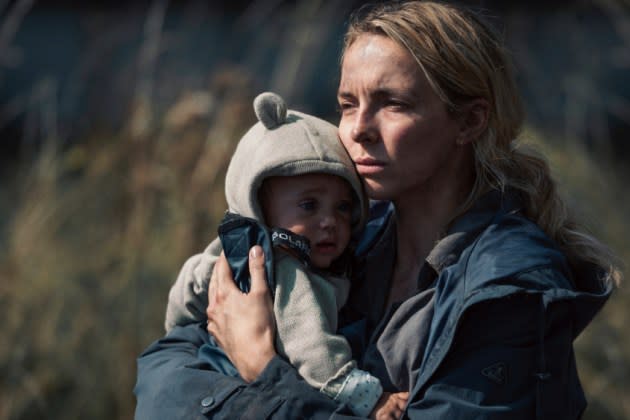‘The End We Start From’ Review: Jodie Comer Makes It Through the Rain in a Gripping Survival Drama

It begins as a spatter of heavy rainfall — nothing out of the ordinary for acclimatized Brits, for whom an actual storm can even be cozily welcome after days of noncommittal drear and drizzle. But then it doesn’t stop, deep-set wet turns to invasive flooding, and what seemed a mere bout of inclement weather has swept you — and countless others like you — out of house and home. Megan Hunter’s speculative novel “The End We Start From” was a neat metaphor for the larger threat in seemingly minor signifiers of climate crisis; briskly adapted by screenwriter Alice Birch, Mahalia Belo’s fine film version matches its pragmatic, coolly urgent vision of a world coming apart slowly, gradually, and then all at once.
Tight in budget and focus, this isn’t disaster cinema of the lurid Hollywood school, revelling in the grand spectacle of destruction. For much of the film’s running time, Belo turns our attention away from the sprawling geographical impact of the great flood and toward its devastating effect on the domestic sphere — as chiefly represented by two young parents (Jodie Comer and Joel Fry) raising a newborn baby with no permanent roof over their heads. That pivot may be a necessity for a modest British indie that’s more in the business of implication than illustration, but Comer’s dauntless, film-powering performance makes an outright virtue of it: The toughness and terror doing battle across her face are more than a substitute for a CGI waterworld.
More from Variety
Pretty much everyone in “The End We Start From” is anonymous: The credits identify Comer’s protagonist only as “Woman,” while other characters are granted a single initial each. This could be any of us, the film appears to suggest. Personal idiosyncrasies and backstories are kept to a minimum, while humanizing detail comes via in-the-moment actions. Only the newborn gets a name — Zeb — as a gesture of the film’s guarded faith in future generations. He arrives as the flood begins, his mother initially stranded in her sodden East London basement apartment in as she goes into labor. Once she’s eventually taken to hospital, it’s clear there will be no homecoming.
The hospital, filling with water and patients, is no steady sanctuary: London cannot hold. So mother, father and baby bundle into their car and head northwards, through blaring traffic jams and officious roadblocks, to the well-stocked rural home of his doting parents (Mark Strong and Nina Sosanya). There, they live the tranquilly isolated survivalist dream for a time. But supplies run out, and tragedy strikes. Hitting the road again, this time with no destination, the young couple must resort to mass shelters, and in time, to unavoidable separation. Alone with her son, the woman encounters humanity’s most anarchic selfishness in times of crisis; in another young mother (a wonderful Katherine Waterston), an American with a dry line in gallows humor, she rediscovers such quaint notions as allyship and empathy.
With previous writing credits including “Lady Macbeth” and “The Wonder,” Birch has form in stories of resilient women in dire circumstances, told with terse rigor. But that’s countered with a hint of stoic sentimentality in “The End We Start From,” an acknowledgement that people sometimes need to spill their feelings (or start an off-key “Dirty Dancing” singalong) to endure another hopeless day. Fleetingly, the film takes the comforting forms of road movie — sometimes without a vehicle — and buddy comedy, but these phases are mere diversions from the protagonist’s increasingly solitary quest to build back life as she knew it. The film invites viewers to consider what they would do in such peril, without supplying any moral guidance as to the right course of action: Comer’s riveting performance, physically tense with desperation, makes us believe, at least while watching, that we’d do whatever she’s doing.
Making the leap from small-screen work on such projects as the BBC’s “The Long Song” and Netflix’s “Requiem,” Belo directs with assured restraint, consistently stressing the human factor. There’s no flashy formal flexing here, though Suzie Lavelle’s damp earth-toned lensing, Arttu Salmi’s clipped, on-edge editing and Laura Ellis Cricks’s subtly decayed production design all play their part in connoting a jittery state of emergency, even when we can’t see the cause. (The effects budget largely goes on eerie late-film images of a ruined Big Smoke, where roads have turned to rivers.) The light electronic intrusions in Anna Meredith’s excellent score are in line with the scarce sci-fi detailing elsewhere: At every turn, “The End We Start From” pushes for immediacy, the sense that this awful near future could be tomorrow.
Best of Variety
Sign up for Variety’s Newsletter. For the latest news, follow us on Facebook, Twitter, and Instagram.

 Yahoo News
Yahoo News 